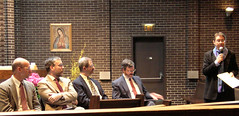I’ll start with the easier of the two questions: When do I wear clerical garb, and why?
My current practice is to wear clericals when I’m exercising the ministry to which I was ordained — that is, when I’m serving in liturgical or educational ministries (or stand available so to do). In practice, that means I wear black on Sundays and on days that I teach, and other days if I’m leading worship (or exercising my teaching ministry in a non-classroom way).
The arguments against wearing clericals involve — insofar as I understand them — the implied claim that a clergyperson is someone special. Clerical attire signifies (on this account) privilege and power, a staked claim on a disproportionate share of heavenly goods. Someone dressed in clergywear can be seen to ask for special attention from the world: “Notice me, respect me, I’m holy.” That not only reflects poorly on the ordained person, but also disables lay ministry; if I, as a priest, am special and notable, then I can naturally be expected to exercise special and notable functions. A non-ordained observer plausibly concludes that she or he need not participate in leadership, in active outreach, in theological reflection, and so on; that, after all, is the special ministry of the ordained.
That’s what they call “clericalism.” It’s a Bad Thing, on even the most charitable account. Everything in the paragraph above contravenes the ideals expressed in Scripture and in the best and wisest of the church’s tradition.
At the same time, it’s more complicated than just that.
If it be granted that some clergy wear their clothes as a claim to privilege, my experience of wearing clericals differs. Often as not, my black clothes and funny collar make me a target for a variety of people’s off-kilter projections. I don’t expect anything different from people when I’m in black, but I wear my uniform since that’s part of a signifying system by which I’m marked as “available for help, spiritual counsel, listening to long explanations of why you don’t go to church any more,” and so on. If it’s a claim to privilege, these are privileges that don’t appeal much to me.
I wear clericals for a variety of reasons. For one, it’s the uniform. I don’t feel any imperative to conceal the fact that I’m a priest, nor to make a big deal about it. It’s my job, as the UPS carrier’s job is to carry packages, and she wears brown, and I wear black.
Should clergy wear uniforms? I can see arguments both ways. For the time being, I’m inclined to think it’s good that people can spot a priest if they feel the need. It’s worth signaling to the world that some people take this stuff seriously enough to make themselves answerable to the world’s outlandish expectations. It’s worth putting myself in the line of ideological fire. And plain clothes don’t ensure clerical innocence; clergy can certainly still manage to be self-important, manipulative, passive-aggressive, abusive rats even without black clothing. Humble is as humble does, in black or in blue jeans or in a natty suit.
If there’s a special-treatment factor, it’s much less a matter of something I expect, but something with which people can surprise me. If my being a priest gives others an occasion to be kinder or more generous than they would otherwise be, I suppose that’s good for them. If they’re extra kind to me one day, it might contribute to their being extra kind to someone else another day. That sort of generosity can be habit-forming.
Does my being visible disempower non-ordained people? Quite possibly so, if they already have a malformed idea of what a priest is. All the more reason, then, that they should see me and observe that I’m not trying to put something over on them, to order them around, to make them gofers for gratifying my self-indulgent whims. All the more reason for them to be able to know that I as a priest am encouraging them, exhorting them to exercise the fullness of their ministries.
People who want a priest can identify me as someone to ask for money, for prayers, for a hand, for directions, for advice. That’s what I volunteered to cope with eighteen years ago (almost nineteen now, making me feel very old). People who resent a priest’s wearing clericals can vent their frustrations at me.
At the end of the day — or more precisely, first thing in the morning, when I get dressed — it’s a matter of a signifying practice. I don’t control the signification of my attire, but I venture that sign because I’m committed to the best of what it signifies. I’m willing to be judged for the extent to which I comply with the pernicious significations (and I certainly don’t want to try to evade responsibility for those significations just by dressing differently). I’m a servant, of a particular kind, and I took on this service willingly; it’s the right thing for me to do. And I don’t mind if you can tell by looking, and I don’t mind if that irks you, and I’m sorry if you read my clothing in the light of poor examples of my colleagues (I try not to hold all police to blame for the bad ones). By wearing a black shirt and collar, I signify my willingness to deal with the complications of a clerical vocation head-on, the bad with the good, and to let you draw your conclusions about how that pans out.
